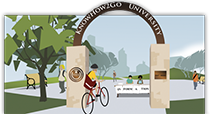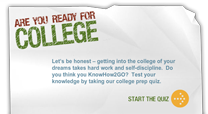Get Ready
Getting ready for college is about setting your mind to do it. You know you're college material. You've got big dreams. You've got what it takes.
Once you set your mind to it, you've got to stay in school, take the tough classes and learn about standardized tests. Use the following sections to learn more and don't forget to take a college tour!
"Why should I get a college degree?"
Has the teen in your life ever asked you this question? Whether you're a parent, guardian or other caring adult, you need convincing, practical answers to share with your teen. Here they are:
"You'll gain greater understanding and skills to help you be successful in our complex world."
College enables you to:
- Expand your knowledge and skills
- Express your thoughts clearly in speech and in writing
- Grasp abstract concepts and theories
- Increase your understanding of the world and your community
- Gain more financial security
"You'll find a greater range and number of job opportunities."
In our changing world, more and more jobs require education beyond high school. College graduates have more jobs to choose from than those who don't pursue education beyond high school.
"You'll earn more money - a lot more."
According to the Bureau of Labor Statistics, the median yearly income for someone with a bachelor's degree is $54,756, while for those with only a high school diploma the amount is $33,176. That's a difference of $21,580! In fact, the greater level of education people complete, the more likely they are to earn more money. Each level of educational achievement provides a boost in earning power - from no high school diploma all the way through a professional degree such as a master's of business administration (M.B.A.), medical doctor (M.D.), or juris doctor (J.D.). The median income for this last group - those with professional degrees - is $86,580!
The difference in the salary earned by higher-educated workers compounds over a lifetime. The estimated earnings during the worklife (approximately 40 years) of a full-time worker who didn't complete high school are about $1 million dollars. Completing high school increases earnings by about a third of a million dollars, and completing a bachelor's degree raises work life earnings to about $2.2 million.
Finally, people with less education often have fewer choices in life and are more likely to depend on government services than the rest of the population: 14.1 percent of high school dropouts were unemployed in 2011 - versus 4.9 percent of college graduates.
Planning for College: Ten Steps
Step 1
Save money as early as possible to help pay for your teen's education.
Step 2
Encourage your teen to make high school count, preparing academically for higher education.
Step 3
Discuss with your teen his or her skills and interests, career options and schools he or she is interested in attending.
Step 4
Meet with the school guidance counselor to determine which schools match your teen's academic abilities and interests.
Step 5
Gather information about the schools your teen is interested in attending, including information on financial aid.
Step 6
Take your teen to visit a college campus and ask the right questions.
Step 7
Help your teen apply for admission. To apply for financial aid, help your child complete the FAFSA.
Step 8
Consider scholarships, grants and work-study programs. Complete any necessary applications or forms and submit them before the deadline.
Step 9
Consider the loan programs available to you and your teen.
Step 10
Learn more about tax credits, deductions and other considerations for education expenses.
Learn more about the college selection process here or visit College Parents of America.
Visit the Campus
The best reason to visit a college campus is to get a personal feeling for the quality of education being offered there. While on a campus visit, you and your teen should ask questions that will reveal a school's commitment to providing the best educational environment. The questions that follow can help:
Level of Academic Challenge?
Challenging intellectual and creative work is central to maintaining a quality learning environment.
- To what degree is studying and spending time on academic work emphasized?
- Do faculty hold students to high standards?
- How much time do students spend on homework each week?
- How much writing is expected?
- How much reading is expected?
Active and Collaborative Learning?
Students learn more when they are directly involved in their education and have opportunities to collaborate with others in solving problems or mastering difficult material.
- How often do students discuss ideas in class?
- How often are topics from class discussed outside of the classroom?
- Do students work together on projects - inside and outside of class?
- How often do students make class presentations?
- How many students participate in community-based projects in regular courses?
- How many students apply their classroom learning to real life through internships or off-campus field experiences?
- Do students have opportunities to tutor or teach other students?
Student-Faculty Interaction?
In general, the more contact students have with their teachers, the better. Working with a professor on a research project or serving with faculty members on a college committee or community organization lets students see first-hand how experts identify and solve practical problems.
- Are faculty members accessible and supportive?
- How many students work on research projects with faculty?
- Do students receive prompt feedback on academic performance?
- How often do students talk with their teachers about what they are learning in class?
- How often do students talk with advisors or faculty members about their career plans?
- Do students and faculty members work together on committees and projects outside of coursework?
Enriching Educational Experiences?
Educationally superior colleges offer a variety of learning opportunities inside and outside of the classroom that complement the goals of the academic program. One of the most important is exposure to students and faculty from diverse backgrounds.
- What types of honors courses, learning communities and other distinctive programs are offered?
- In what ways do faculty use technology in their classes?
- How often do students interact with peers with different social, political, or religious views?
- How often do students interact with peers from different racial or ethnic backgrounds?
- How many students study in other countries?
- Do students participate in activities that enhance their spirituality?
- What percentage of students do community service?
- What kinds of activities are students involved in outside of the classroom?
- What kinds of events does the campus sponsor?
- Is a culminating senior year experience required?
Supportive Campus Environment?
Students perform better and are more satisfied at colleges that are committed to their success - and that cultivate positive working and social relationships among different groups on campus.
- How well do students get along with other students?
- Are students satisfied with their overall educational experience?
- How much time do students devote to co-curricular activities?
- How well do students get along with administrators and staff?
To what extent does the school help students deal with their academic and social needs?
To learn more, visit College Parents of America.





